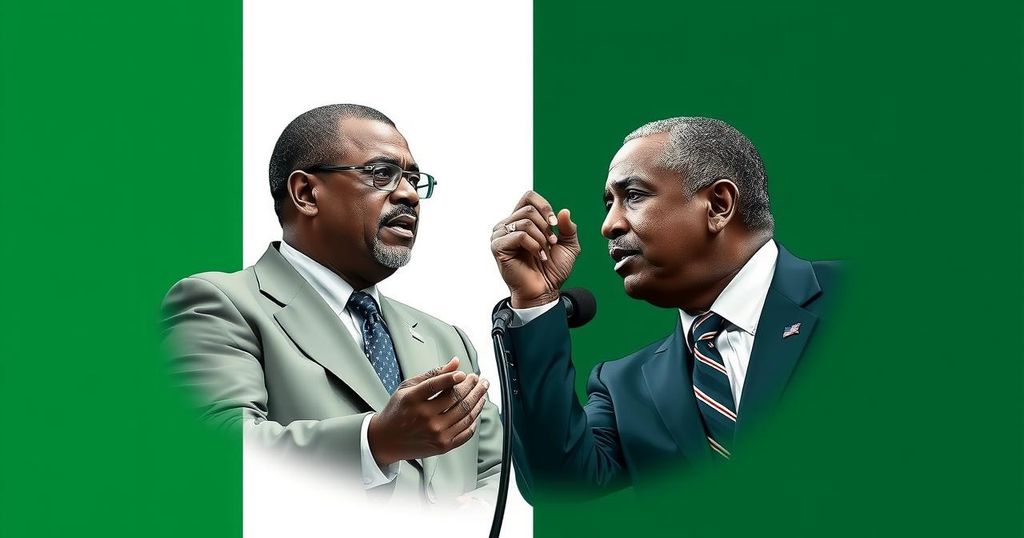Politics
AFRICA, ALL PROGRESSIVES CONGRESS, ALL PROGRESSIVES CONGRESS PARTY, BOLA TINUBU, BUHARI, CORRUPTION, DEMOCRACY, GOOD, GOODLUCK JONATHAN, GOVERNANCE, JONATHAN, LABOR PARTY, LAGOS, MUHAMMADU BUHARI, NIGERIA, NORTH AMERICA, OBI, OPPOSITION, PETER OBI, POLITICS, UNITED STATES
Marcus Li
0 Comments
Reflections on Acceptance and Unity After the 2023 Elections in the U.S. and Nigeria
This piece reflects on the emotional landscape following the U.S. presidential election, drawing parallels with the author’s experiences during Nigeria’s electoral challenges. The commentary highlights the difficulties of accepting electoral outcomes, the necessity of humility from leaders, and the importance of addressing socio-economic issues to foster unity and trust in governance.
The recent U.S. presidential election has prompted reflections on the post-election reality, especially for those whose preferred candidates did not win. The author draws parallels to their own experience during the 2015 Nigerian election between Muhammadu Buhari and Goodluck Jonathan, expressing the difficulty of accepting electoral outcomes. The disappointment felt by many Nigerians when Peter Obi, a favored candidate, lost to Bola Tinubu resonates with the emotions observed following the U.S. election. This sentiment transcends borders, as ignited by deeply entrenched political divisions, both nations face challenges of unity and progress in the aftermath of their respective elections.
The author recalls their personal journey from Nigeria to the U.S. amidst political turmoil and reflects on the broader implications of leadership choices in both countries. With Nigeria experiencing substantial economic hardships under Tinubu’s administration, the writer emphasizes the role of political integrity and accountability in fostering trust and faith in governance. The absence of these elements evokes feelings of disenfranchisement among citizens, leading to calls for a shift in the political landscape.
Drawing comparisons between Tinubu and Donald Trump, the author highlights the legal controversies surrounding both leaders. While Tinubu faced allegations regarding his election legitimacy, Trump encountered challenges related to his conduct as president. Such narratives, the author notes, incite skepticism about governance and promote despair among constituents. Moreover, issues surrounding division, polarization, and the perceived failures of leadership stir frustration and a yearning for restorative change.
In examining the potential for reconciliation and unity, the commentary points to the paramount importance of humility from leaders and supporters alike. The complexities of navigating political relationships necessitate a significant shift in attitudes to reduce animosity and foster an inclusive environment for discourse. As expressed, humility could serve as a foundation for healing in both nations, where after tumultuous elections, citizens are left grappling with the realities of their leadership.
The article examines the aftermath of the recent U.S. and Nigerian presidential elections through the lens of the author’s experiences. It reflects on the emotional toll of electoral defeats, the challenges of political division, and the necessity for healing within societies facing deep-rooted socio-economic issues. By relating personal reflections and broader implications, the author emphasizes the parallels between the elections in Nigeria and the U.S., highlighting shared dilemmas of leadership integrity, civic trust, and the accountability of elected officials.
In conclusion, the reflections on the U.S. and Nigerian elections reveal the pervasive challenges of accepting electoral outcomes and the necessity for unity amidst political division. Both nations face significant socio-economic issues and demands for leadership accountability. The author urges leaders and citizens to foster humility and compassion, advocating for a more inclusive dialogue that prioritizes reconciliation over hostility. Ultimately, the future of both countries hinges on the ability to bridge divides and restore faith in governance, where attitudes can facilitate healing in the wake of electoral disappointments.
Original Source: baptistnews.com




Post Comment